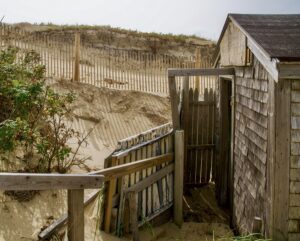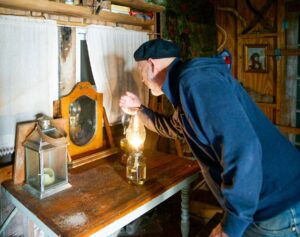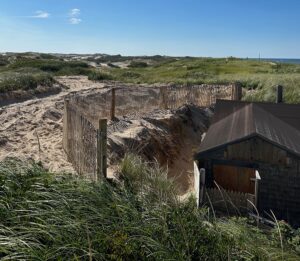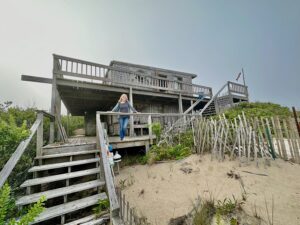PROVINCETOWN — Just two days before the federal government was expected to enter a shutdown caused by Republicans in Congress, the National Park Service signed a five-year special-use permit allowing Sal Del Deo, 95, and his son, Romolo, to return to the dune shack, known as “Frenchie’s,” that they have taken care of for decades.

The Del Deos’ lawyers, Bruce Bierhans and Anthony Mavronicolas, began negotiating with lawyers in the Dept. of the Interior’s Office of the Solicitor in mid-July, Romolo said after the permit was signed on Sept. 29. Those conversations became much more constructive in mid-August, he said, and by Labor Day he believed a resolution was in sight.
The solicitor’s office worked at a breakneck pace in the last week before the expected shutdown, Romolo said. The five-year special-use permit was signed Friday afternoon by Del Deo and Cape Cod National Seashore Supt. Brian Carlstrom. On Saturday morning, a team of rangers unscrewed the boards blocking the shack’s doorway that they had installed on June 29.
“The rangers called me from the dunes that morning, told me what they had done, and asked if there was anything else the shack needed,” Romolo said. “It was a completely human discussion and very kind.”
Romolo’s mother, Josephine Del Deo, “helped safeguard the embryonic Cape Cod National Seashore … and preserved the historic character of Provincetown,” according to her obituary in the New York Times by David W. Dunlap. Though she died in 2016, her family still celebrates her Oct. 4 birthday at the dune shack that she and Sal had enjoyed since 1953.
Romolo said that getting the shack reopened by that date had become important to people at the Interior Dept.
“It became an entirely different conversation,” Del Deo said. “We were getting emails at 7 a.m. and throughout the day, and I think it’s unusual and really impressive that people who handle hundreds of things per day were pushing this little dune shack and these crazy bohemians in this kooky town to the top of their stack of priorities.”

The new permit comes with an annual rent of $3,780 and a requirement to carry insurance, which runs about $500, Romolo said. It is not spelled out in the document, but Del Deo’s understanding is that a public leasing contest in which anyone can apply for a 10-year lease will take place toward the end of the five years.
The other family-occupied dune shacks in the Peaked Hill Bars Historic District are also moving toward some kind of resolution of this summer’s controversial leasing program.
Janet Armstrong, whose parents, David and Connie Armstrong, bought a dune shack and an acre of land in 1948, more than a decade before the National Seashore was created, is no longer facing imminent eviction. In August, she accepted a one-year special-use permit from Supt. Carlstrom, which could be reissued for a second year if the agency has not finished holding a public leasing contest for that shack by Aug. 31, 2024.
The National Park Service took the dune shack and the land by eminent domain in 1981 and gave the Armstrongs a choice: they could accept a lifetime use permit, a 25-year permit, or the bulldozing of the shack. They accepted the lifetime permit.
According to the Dune Shack Historic District Preservation and Use Plan of 2012, when lifetime permit holders die, the National Seashore is supposed to issue a series of one-year permits to the next of kin until a public leasing process can be concluded.
National Seashore officials did not realize that David and Connie had both died until 2023, almost seven years after Connie’s death and 10 years after David’s. The agency sent Janet Armstrong a 90-day eviction notice in June.
She argued that without a committed caretaker the shack could be irreparably damaged by storms and vermin, and that the Use Plan called for one-year permits.
Armstrong said the agency was now “backing toward” following its own rules.
“They’ve made so many mistakes,” Armstrong said, “and it feels like they’re backstepping — ‘OK, we’ll give you a year’ — ‘OK, we’ll give you two years.’ They’re gradually approaching what should have been done correctly to begin with.”
The RFP Shacks
The other eight dune shacks that are occupied by families are all part of the current public leasing contest that began on May 1. Those families had all been told to be ready to vacate their dune shacks by Sept. 2 if they did not win a 10-year lease.

In mid-August, those families were told their occupancy would be extended to Sept. 29, followed by a four-week “administrative period” during which new leaseholders would have the right to visit the shacks.
On Oct. 2, two of those families were given further extensions to Nov. 15 and told that the award of a 10-year lease “will be completed within the next few weeks.”
The other families were told that the selection of a new leaseholder “will not be completed in the near term.” Their permits were extended to April 30, 2024.
The Park Service has refused to confirm how many applications were received following the May 1 request for proposals, but the denial of a records request for all of the applications by the Independent showed there were 406 “responsive records.”
Depending on how those records are formatted, that means there could be up to 406 complete applications. At an average of 51 applications per dune shack, that number could help explain why the agency is struggling to meet its own deadlines.
A Changed Perspective
Romolo Del Deo said he believes that attitudes at the Park Service have changed — and not only toward his family.

“Our legal arguments notwithstanding, they could have slow-rolled us in court,” he said. “They had no timeline to respond, and it could have been years.”
Del Deo said that attention from the press, the public, and elected leaders had made space for a different approach. In particular, he said, coverage in the Provincetown Independent, the Boston Globe, the New York Times, Smithsonian magazine, and the investigative TV show Chronicle had raised awareness in Washington, D.C., including at the Dept. of the Interior.
“The fact that the story stuck, and the national media kept on writing about it into August — I think there are kinder souls at the Interior Dept. who don’t want to see the National Park Service being constantly slagged in the press,” Del Deo said. “I think people were given the leeway to try a different approach.”
Editor’s note: A previous version of this article, published in print on Oct. 5, inaccurately characterized a Provincetown town meeting vote taken in 1961 and described in David W. Dunlap’s obituary for Josephine Del Deo. That vote did not “endorse the creation of the Cape Cod National Seashore” but rejected an effort to have the town take possession of the Province Lands, which would have seriously compromised the extent of the parkland in Provincetown.
